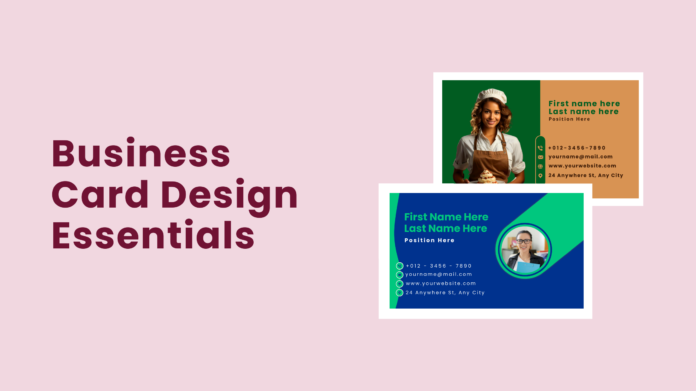In the age of digital communication, where emails, social media, and online networking dominate, one might think that traditional business cards have become obsolete. However, that assumption couldn’t be further from the truth. Business cards continue to be an essential tool for professionals across various industries. They are not just pieces of paper with contact information but powerful instruments that buisness cards can leave a lasting impression, facilitate networking, and establish credibility.
In this comprehensive guide, we will explore the numerous benefits of business cards, why they remain relevant in today’s digital world, and how they can enhance your professional image, especially once created with special online tools that enhance the visuals such as image background remover to highlight proper branding.
1. Making a Lasting First Impression
First impressions are crucial in the business world. When you meet someone for the first time, whether at a conference, a networking event, or a casual encounter, the initial impression you make can significantly impact your future interactions. A well-designed business card can help you create a positive and lasting first impression.
Business cards are tangible, physical objects that people can hold, examine, and remember. Unlike a fleeting introduction or a quickly forgotten email, a business card can serve as a reminder of your encounter. It also reflects your professionalism and attention to detail, which can leave a favorable impression on potential clients, partners, or employers.
2. Building and Expanding Your Network
Networking is a critical aspect of any business or professional career. Whether you’re attending industry conferences, trade shows, or local business events, having a stack of business cards ready to distribute can significantly enhance your networking efforts.
Exchanging business cards is a traditional and effective way to initiate and maintain connections. When you hand someone your card, you’re not just giving them your contact information; you’re providing them with a tangible link to you and your business. This physical exchange fosters a sense of connection and can lead to more meaningful relationships than merely exchanging email addresses or LinkedIn profiles.
Moreover, business cards can be easily passed along to others. If someone you meet thinks your services might be valuable to a colleague, they can quickly hand over your card, expanding your network even further.
3. Establishing Credibility and Professionalism
In a world where anyone can create a digital presence, establishing credibility is more important than ever. A business card can serve as a tangible representation of your brand, conveying a sense of legitimacy and professionalism.
A well-crafted business card with a clean design, quality printing, and essential information can speak volumes about your commitment to your business. It shows that you’ve invested time and resources into your brand, which can build trust with potential clients or partners.
Furthermore, in certain industries, particularly in more traditional sectors, the absence of a business card can be seen as a lack of preparedness or professionalism. Having a business card on hand demonstrates that you are serious about your work and ready to engage with others in a professional manner.
4. A Convenient and Efficient Tool for Communication
In an era dominated by smartphones and digital communication, business cards offer a refreshing simplicity. They provide all the essential information someone needs to contact you—without the need for technology.
Business cards are convenient for both the giver and the receiver. They don’t require internet access, charging, or any other digital infrastructure. This makes them particularly valuable in situations where technology may be limited, such as international travel or remote locations.
Additionally, the act of physically exchanging business cards often prompts a brief conversation, allowing both parties to establish a more personal connection. This face-to-face interaction can be more memorable and impactful than a digital exchange, where the human element is often lost.
5. Versatility in Design and Branding
One of the most significant advantages of business cards is their versatility in design. Unlike digital forms of communication, where formats are often standardized, business cards allow for creative freedom in how you present your brand.
Your business card can be a canvas for showcasing your brand’s personality and values. From the choice of colors, fonts, and images to the card’s material and finish, every aspect of the design can be tailored to reflect your brand’s identity.
For example, a sleek, minimalist card with a matte finish might be ideal for a tech startup, while a luxurious card with gold embossing could be perfect for a high-end fashion designer. The design choices you make can communicate a lot about your business and set you apart from the competition.
Moreover, business cards can incorporate various elements that make them stand out, such as QR codes that link to your website, social media profiles, or a portfolio. This blending of traditional and digital elements can create a more dynamic and engaging way for people to connect with your business.
6. Cost-Effective Marketing Tool
Compared to many other forms of marketing, business cards are incredibly cost-effective. They offer a high return on investment, especially considering their impact and longevity.
Printing business cards is relatively inexpensive, even for high-quality designs. Once printed, they can be distributed widely and continue to promote your business long after the initial exchange. Every time someone looks at your card, they’re reminded of your brand, making business cards an ongoing advertisement for your services.
Additionally, because they are small and portable, business cards can be distributed in various contexts, from casual meetings to formal events, without the need for additional resources or planning.
7. Complementing Digital Presence
While digital marketing and online networking are essential in today’s business landscape, business cards complement these efforts rather than compete with them. They bridge the gap between the physical and digital worlds, providing a tangible connection to your online presence.
For instance, your business card can include your website URL, email address, and social media handles, directing recipients to your digital platforms. This integration allows you to combine the personal touch of a face-to-face interaction with the broad reach of digital communication.
Furthermore, in environments where digital information might be overwhelming or impersonal, a business card can serve as a physical reminder of your brand, prompting people to visit your website or follow you on social media at their convenience.
Conclusion
In a world where digital communication dominates, business cards remain a valuable and relevant tool for professionals. They offer numerous benefits, from making a lasting first impression and building networks to establishing credibility and enhancing your brand. Business cards are versatile, cost-effective, and serve as a bridge between the physical and digital worlds.
By investing in well-designed business cards, you can elevate your professional image, create meaningful connections, and ensure that your brand remains top of mind in a competitive business landscape. Whether you’re a seasoned entrepreneur or just starting, don’t underestimate the power of a simple buisness cards—it could be the key to your next big opportunity.

